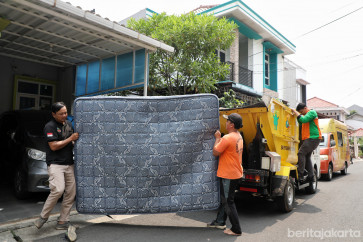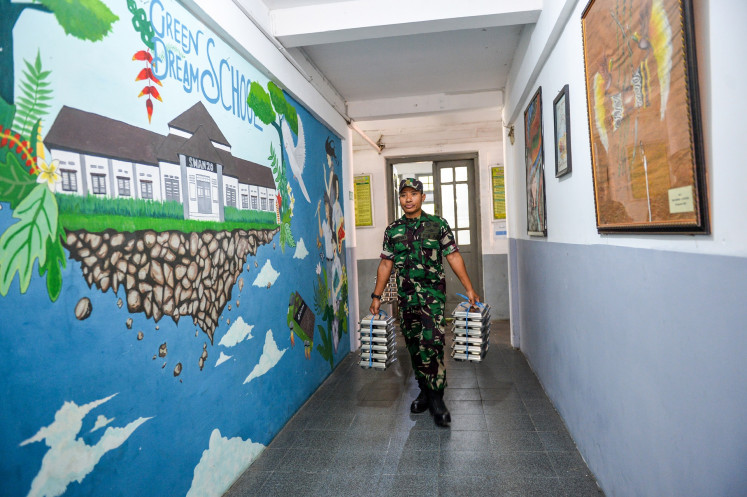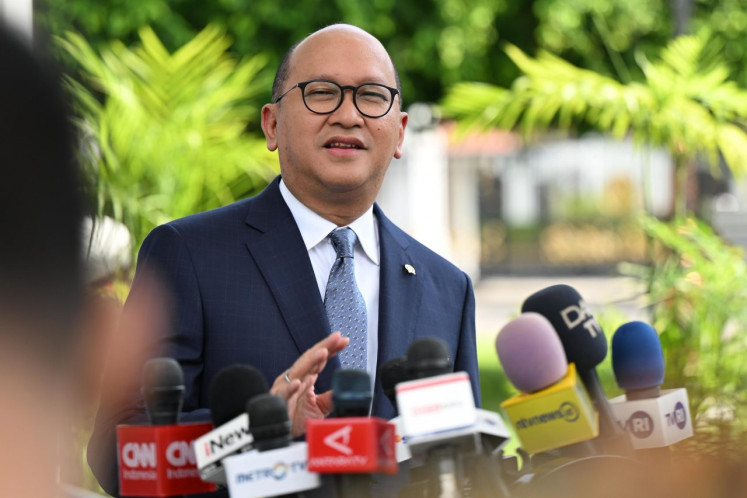Popular Reads
Top Results
Can't find what you're looking for?
View all search resultsPopular Reads
Top Results
Can't find what you're looking for?
View all search resultsAllow refugees to work
Last month, former Jakarta deputy governor Sandiaga Uno signaled he is exploring the possibility of integrating refugees and asylum seekers into the One District One Center of Entrepreneurship (OK OCE) program as instructors
Change text size
Gift Premium Articles
to Anyone
L
ast month, former Jakarta deputy governor Sandiaga Uno signaled he is exploring the possibility of integrating refugees and asylum seekers into the One District One Center of Entrepreneurship (OK OCE) program as instructors. Sandiaga understands there are around 13,000 asylum seekers and refugees in Indonesia, and many of them have skills in areas like engineering or teaching. At least it is good to hear public officials willing to explore the idea of employment access for refugees.
Indonesia currently does not allow asylum seekers and refugees to work or engage in any income-generating activities. The idea is considered too sensitive and would not sit well with the public, whose negative sentiment toward foreign workers has been exacerbated recently because of the influx of Chinese workers.
Refugees and asylum seekers, however, are people forced to flee prosecution at home. Affording them access to employment may be the most logical and realistic policy option for the government.
Two factors must be considered. First, refugees and asylum seekers are already here, and as long as conflicts in their home countries persist, they will likely remain here for an extended period of time.
Due to the long process of refugee status determination and the low number of resettlements, i.e. moving refugees to a third country willing to take them in, many refugees have stayed in Indonesia for more than 10 years.
There is nothing the government can do to change this. Sending refugees back to their country without their consent is not only a serious violation of international law, but also a violation of our constitution, which guarantees the right to asylum.
Second, international funding for refugees and asylum seekers is shrinking. All this time, refugees and asylum seekers have had their needs met by international organizations, such as the International Organization for Migration (IOM), the United Nations High Commissioner for Refugees (UNHCR, also known as the UN Refugee Agency) and to a certain extent also NGOs.
In fact, many government expenses incurred to handle refugees in the past years have been reimbursed by the IOM. This, however, is changing, as funding continues to shrink.
In fact, the IOM has decided to stop funding for new arrivals due to significant cuts by donors.
Faced with these two facts, the idea of employment access becomes relevant. By working, refugees will be able to look after their own needs. They could even contribute to the economy by creating value and paying taxes. Many studies point to the positive impacts of refugees on the host country’s economy when they are allowed to work.
The main concern about employment access for refugees usually related to the purported displacement effect, i.e. refugees taking jobs from the locals. Studies suggest, however, that this effect is limited, if it exists at all.
The number of working-age refugees in Indonesia is only around 11,000, which compares to the Indonesian labor force of 130 million. Any effect on the labor market would be negligible.
Moreover, strategies could be developed to provide employment access for refugees while expanding job opportunities for locals. One idea is to promote joint ventures between refugees and locals.
Not only would that allow local people to tap into the resources of international assistance, the shrinking international funding could also be used more efficiently for productive purposes.
In addition to economic benefits, there are also social benefits to consider. Allowing refugees to work will integrate them in the social life organized around work.
Opportunities to work will also incentivize them to overcome language barriers and learn the national language, which would improve interaction with local people. Better interaction minimizes risks of misunderstanding and conflict.
Another worry often cited is the pull factor — the right to work will draw more refugees to Indonesia. However, the number one factor determining where refugees go is geography. Not only is Indonesia close to Afghanistan and Myanmar, two major refugee-producing countries, but it is also strategically located to the nearest industrialized country — Australia.
For Indonesia, therefore, hosting refugees is an accident of geography that cannot be changed. After all, as Indonesia welcomes its many riches provided by geography, we must also contend with the challenges that come from it.
As can be seen, there seems to be no meaningful alternative to this policy. The government could try to take over the IOM’s role and provide for refugees’ basic needs through its budget, but with no real end in sight, the feasibility of such a policy remains unclear.
Taking over from the IOM or the UN is likely a much harder sell than simply allowing refugees to work.
The policy of employment access, therefore, is not an option based on idealistic or moral principles, but rather based on a realistic, even pragmatic, assessment of the situation.
_________________________________
The writer is a researcher at the Institute of International Studies at Gadjah Mada University (UGM) in Yogyakarta, and a lecturer at its Department of International Relations.










